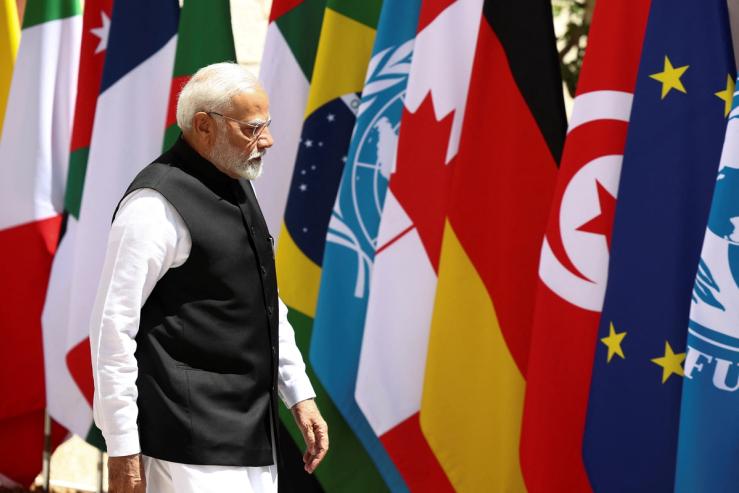The News
Indian Prime Minister Narendra Modi arrived in Italy for the G7 summit Friday, his first international trip after an unexpectedly underwhelming performance in India’s recent elections saw his Hindu nationalist Bharatiya Janata Party fall short of an outright majority.
Modi’s visit will provide a glimpse into his foreign policy approach going forward, with some analysts predicting India’s new coalition government may improve the country’s global standing.
SIGNALS
Modi’s non-alignment policy may become untenable
Modi has so far maintained his predecessors’ longstanding commitment to “neutrality, non-alignment, and fence-sitting” in the international arena, largely succeeding in cultivating relations with countries that are sworn enemies of each other — though how long he can keep the US on side while continuing to court its biggest foes remains to be seen, a columnist argued in The Diplomat. Modi’s goal of transforming India into a developed nation by 2047 with the help of Western, and particularly US, investment may increasingly require him to make concessions on key issues like Russian oil imports, a geopolitics expert wrote in Nikkei Asia: But rising global instability may also force him to develop a new model of Indian stability that relies less on other powers, he added.
Coalition could be ‘the best thing’ for Indian foreign policy
India’s first coalition government since 2014 is “the best thing that could have happened to Indian foreign policy,” insofar as it bolsters the country’s image as a robust democracy with a diversity of opinion, the Hindustan Times’ US correspondent argued. Western officials, many of whom have battled criticism that deepening ties with India represents a betrayal of their respective countries’ commitments to human rights, can now confidently point to the election results as proof of India’s democratic credibility. On the other hand, Washington and its allies may soon miss Modi’s strongman era, if his new government becomes “so consumed with its domestic travails” that there’s no bandwidth left to cooperate effectively with the US, a United States Institute of Peace adviser noted.
Pakistan may be ‘quite happy’ with a weaker Modi
Anti-Pakistan rhetoric featured prominently in the BJP’s election campaign, Al Jazeera reported, further eroding the already frayed ties between the two neighbors. But after losing his majority, “[i]t will be a more chastened and somewhat weaker Modi now sitting in the PM office in Delhi,” a Pakistani senator told the magazine Frontline. Regardless, Islamabad expects little change, if any, from Modi’s third term, and will adopt a “wait-and-see policy” concerning the prospect of normalized relations, Pakistan’s former representative to the UN added.



